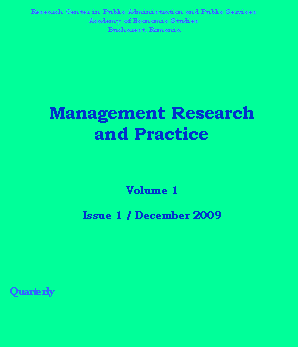
BUSINESS EXCELLENCE AND MANAGEMENT
ISSN
2248-1354 (print)
2668-9219 (online)
ISSN-L: 2248- 1354
|
Home |
|
| Journal description | |
| Aims and scope | |
| Publication ethics | |
| Indexation | |
| Editorial information | |
| Editorial team | |
| Editorial Board | |
|
Journal content |
|
| Current issue | |
| Previous issues | |
| Special issues | |
| Guideline for authors | |
| Submission | |
| Manuscript style | BEMAN Template |
|
|
| Volume 8, Issue 2, June 2018 |
|
1. PROMOTING CULTURAL TOURISM IN GREECE
Florentina PÎRJOL Romania
Diana Elena MOCANU Romania
Lia Lucica RADOMIR Romania
|
|
This paper aims to promote Greece by presenting it within the specialized literature that also presents the theoretical elements that make reference to the most important terms that underlay this paper, such as promotion and tourism. Moreover, the main purpose of this paper is to promote cultural tourism in Greece as well as measuring the transparency of this country. The paper is based on a case study that is conducted with the help of a sociological analysis that was possible with the construction of a questionnaire that aims to determine the degree of interest the tourists have towards the cultural tourism of the analyzed country. Following the results obtained from the case study, it appears that most of the respondents perceived the situation of the cultural tourism in Greece as being very important. This means that there are generally people who are interested in the cultural tourism of this country. Also, the development of the cultural tourism in the analyzed country is perceived as being important by the majority of the respondents, which means that a program meant to promote this type of tourism in Greece would be necessary. From the study, the most important means of promoting cultural tourism in this country is the online environment. Therefore, so much more should be invested in this field. When people chose a tourist destination they want that destination to offer them unforgettable experiences (38% of the respondents), cultural event (36% of the respondents, resulting in a fairly important percentage). In conclusion, tourists would be more interested in this type of tourism if it would be better promoted in the online environment and not only... |
|
2. THE PECULIARITIES OF HUMAN RESOURCES IN THE TOURISM INDUSTRY
Reine A. TFAILY
Romania |
|
The competitiveness of a tourist destination is mainly based on its ability to offer unforgettable, unique and unparalleled experiences to customers. Due to the intangible component of the tourist product, it is the result of the facts, actions and performance of people engaged in tourism for the satisfaction of travelers. The cost of available human resources is a major factor determining the competitiveness of a destination, considering the fact that the tourism industry is a large labor force. The importance of human resources in the tourism industry lies in the skills, knowledge and skills that make the human resource a valuable asset of tourism. The knowledge that tourism employees must have is an important factor determining the competitiveness of a tourist destination. The present article identifies the human resources issues affecting the tourism sector, namely low wages, high demand for staff flexibility, high levels of labor instability or skills shortages. For most tourism companies, predicting skills that will be needed in the future in the tourism industry, under current vulnerability and instability, is a real challenge... |
|
3. CONSEQUENCES OF ORGANIZATIONAL STRESS ON WORKFORCE PRODUCTIVITY. RESEARCH ON STRATEGIES TO PROMOTE A SUSTAINABLE WORKFORCE
Bilal El TOUFAILI The Bucharest University of Economic Studies, Bucharest Romania
|
|
Work has an important contribution to employee welfare. Investing in improving the overall welfare of employees at work can have more benefits for employers. Employee well-being at work involves issues such as: providing adequate resources, good communication, a reasonable degree of employee control over your own jobs, a balanced workload, job security and change management, positive work relationships, favourable working conditions. Employees who benefit from a positive work environment are responding to an increased organizational commitment. The paper provides an organizational holistic approach to stress management. It advocates increasing the quality of jobs where both employees and employers assume a shared responsibility for managing stress at work. It must be acknowledged that, by optimizing the health status of the workforce, we can ensure the good health of the organization... |
|
4. PREVENTING NEGATIVE VALUES WHEN FORECASTING NON-NEGATIVE TIME SERIES VARIABLES
Ali TFAILY
The Bucharest University of
Economic Studies, Bucharest |
|
Long run time series variables forecasting is of special importance to academics and professionals alike. In this paper, the disadvantage of the “Natural Logarithm” transformation that prevents generating negative values in the forecast horizon is discussed. An alternative technique that does not suffer from the disadvantage of the “Natural Logarithm” transformation is presented. Both methods have been applied for forecasting the average USD deposits rate offered in the Lebanese retail banking industry... |
Other ASE journals


